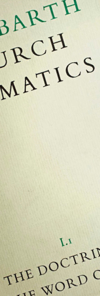The Church … puts to itself the question of truth, i.e., it measures its action, its talk about God, against its being as the Church.
Karl Barth, Church Dogmatics I/1, p.4
One more go at this. Elsewhere, I have written about Hans Frei’s interpretation of Barth’s break with liberalism. In Frei’s account, the central conviction that Barth rejected in his liberal teachers’ theology was their ‘relationalism’: their conviction that theology begins with a given relation between a human being and God. For a relationalist theologian, the basic datum that theology elaborates, and to which its claims are beholden – the basic reality that disciplines theological speech, even if theological speech can never be fully adequate to it – is some deep consciousness or awareness or feeling in which the human subject knows itself to be related to the absolute. The basic datum is, to put it differently, ‘faith’ – but fides qua rather than fides quae: it is faith as the coming to the surface in our minds and lives of the deep relatedness to the absolute given in all human knowing and willing. Theology knows this faith first of all, and only then knows human beings as the ones who have this faith, and God as the one to whom this faith relates them – the absolute that becomes present in this faith. But it is this faith, this relation, that is the source and norm of relationalist theology (as Frei interprets it).
In Frei’s reading, Barth’s protest against liberalism was a protest against relationalism: God is not given in this relationship; God is Lord over this relationship; this relationship too stands under God’s judgment, and the task of theology is to know the God who is its judge, the God who is free over it, the God who is God.
Am I suggesting that the Barth of the Church Dogmatics fell into a new, ecclesial relationalism? That the practice of the church became a given for him, and that theology can only measure its talk about God against this practice?
No, not at all. Theology knows the practice of the church as a practice that points away from itself. It knows it as a practice under discipline and under judgment – and as a practice that points to, but does not contain or control the source from which judgment comes.
This post is part of a series on the opening of Karl Barth’s Church Dogmatics I/1.


Recent Comments